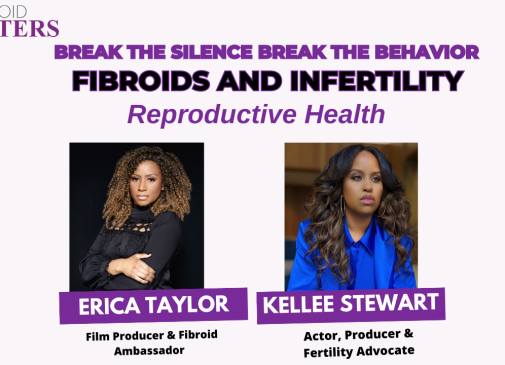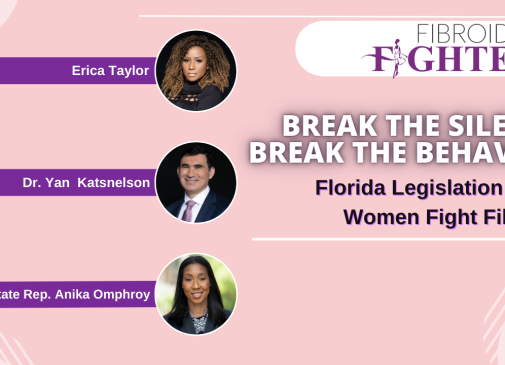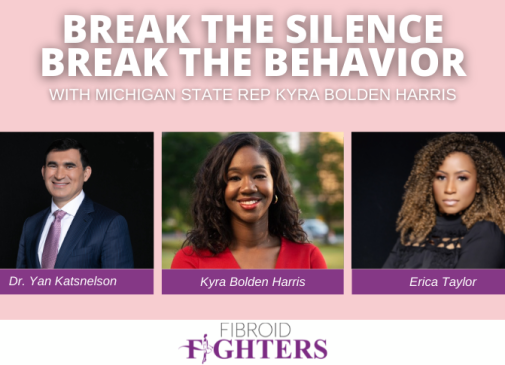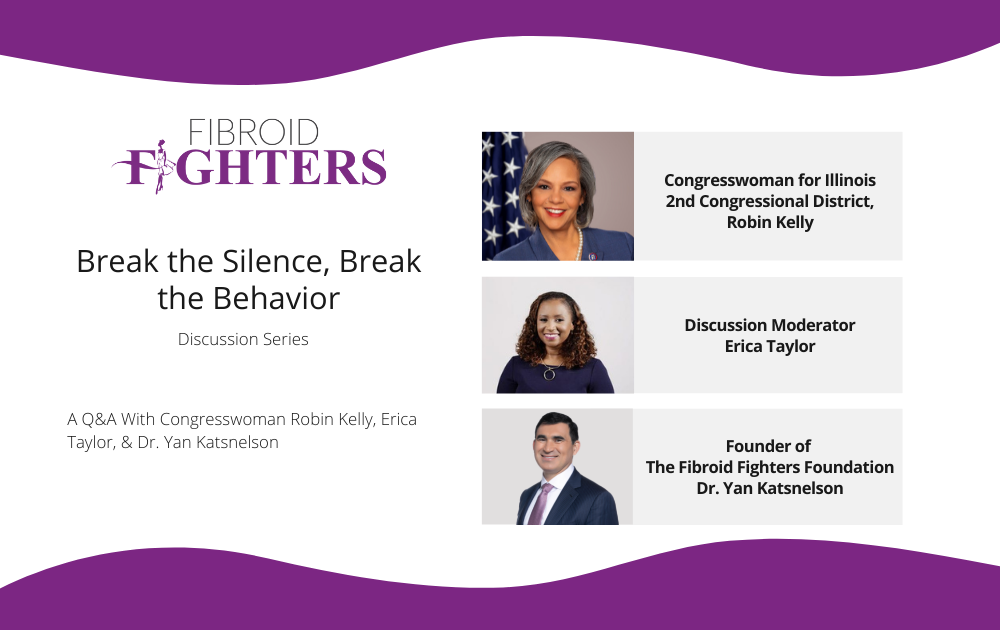
Why Fibroid Education & Treatment Must be a Congressional Priority
Fibroid Fighters’ Ambassador, Erica L. Taylor interviewed Congresswoman Robin Kelly from Illinois 2nd congressional district and our Founder, Dr. Yan Katsnelson as part of the Break the Silence, Break the Behavior Video Series, which is striving to bring national awareness to the uterine fibroid epidemic and lack of treatment options.
Congresswoman Kelly is one of the sponsors of the Stephanie Tubbs Jones Uterine Fibroid Research and Education Act 2021 introduced on March 18, 2021, by New York Representative Yvette D. Clarke. Kelly strongly supported the bill that would appropriate $150 million over five years to establish new research funding as well as better patient and provider information.
Kelly is no stranger to speaking up for women’s rights to better education, opportunities and healthcare. She represents a diverse district—part urban, part suburban, and part rural—spanning from Chicago’s South Side to Kankakee County.
The Q and A interview focused on what needs to be done to make women’s healthcare a priority, especially when it comes to treating fibroid disease. You can watch the entire interview on our site here.
You’re so passionate about wellness. One of your top priorities is protecting a woman’s right to make her own healthcare choices. Why is access to useful health education so important to you?
Kelly: Health education is, frankly, an empowerment tool for women to ensure that women can make informed health decisions that lead to a better life, physically, mentally, and emotionally. If women have education, they can make better decisions about their own health and not depend on other people.
One of the goals of the Uterine Fibroid Act is to create awareness about uterine fibroids. Why is it so critical to reach young girls and women between the ages of 16 to 26?
Katsnelson: Fibroid disease is the most common disease that women face in their lives. Up to 80 percent of women 50 years old suffer from fibroid disease in the black community and 70 percent in the white community. But what is terrible is that the disease starts early: not at age 45 or 50 as statistics suggest, but between the ages of 18 and 30. Of these, 36 percent of young black women suffer from symptomatic fibroid disease and seven percent of white women. Unfortunately, fibroid disease starts earlier in the black community, it’s more symptomatic, with an increased size and number of fibroids.
Because it’s a progressive disease, young women normalize abnormal: they think it’s just my menstrual period getting a little longer and a little more painful. Then, there is a little more bleeding, and now I cannot conceive a baby.
Fibroid disease puts women behind in school, college, or at work. If they would just know that there is a minimal invasive treatment for this, it would normalize life. It would bring health equity and equalize them with other women that don’t suffer from fibroids. Non-surgical treatment exists like uterine fibroid embolization, but so many don’t know that it’s covered by insurance. If women know their options, they can make the choice that’s right for them.
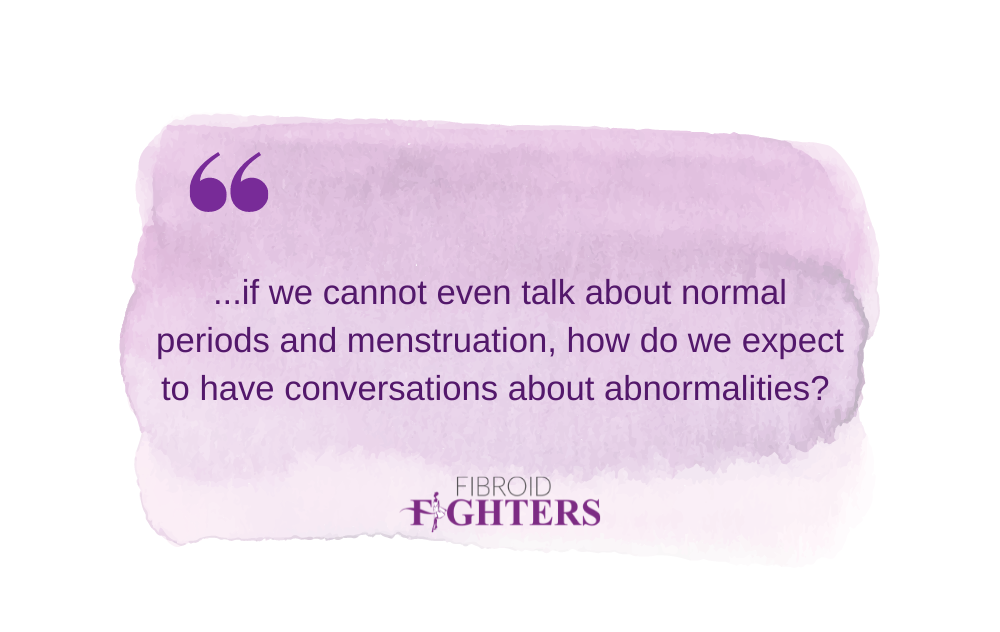
Kelly: We need to make sure that we have better conversations around women’s health. There seems to be a stigma associated with reproductive health. There’s a “Stop Period Shame” movement going on. But, if we cannot even talk about normal periods and menstruation, how do we expect to have conversations about abnormalities?
When I was in elementary school, we had health classes and I remember talking about some of these things. Now there is less and less of that, if at all, that continues in many of our public schools.
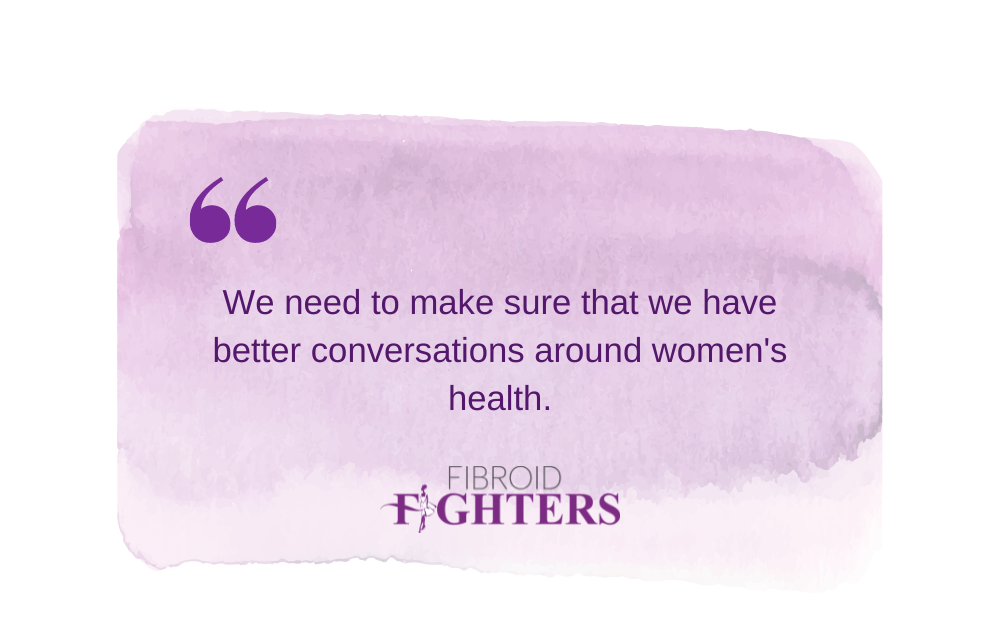
Kelly: We put more on educators to do more, but as you know, it really takes a village. I’m part of a [collegiate] sorority and we talk about important topics with those we work with. Religious organizations, no matter what religion, can help. We need to talk about it in more spaces. It would be lovely if we could have health classes in school, or even talk about it in gym. There needs to be wider involvement from a variety of places that deal with young people and young women.
That’s a great segue from talking about community involvement to one of your priorities: keeping politics out of the doctor’s office so women can make the best healthcare decisions for themselves and their families. Can you talk more about how this became a priority for you?
Kelly: The Equal Rights Amendment has still not been enshrined in the Constitution and politicians are still trying to tell women what healthcare they can and cannot receive. This is wrong.
Women are intelligent enough to have their own conversations with their providers to make decisions for themselves. I think it’s insulting that other people are coming into the doctor’s office making decisions trying to tell us what to do with our bodies. We’re constantly fighting—whether it’s reproductive health, sexual education, the human papillomavirus, vaccine status, or contraceptive needs. These are personal decisions and women should be allowed to make those decisions.
Dr. Yan, what is the importance of community involvement?
Katsnelson: The importance of community involvement is it makes the topic news and brings understanding to the seriousness of a damaging or debilitating problem. Women shouldn’t have to choose between invasive surgery and continued pain from fibroids. UFE, a non-surgical and FDA-approved procedure, gives women freedom from their fibroid symptoms. Patients need knowledge to make informed decisions for their own well-being.
I became a cardiovascular surgeon because I wanted to save a life. To make the biggest difference you have to treat the sickest patients. As we began looking at cities, it was eye-opening. In New York, they have so many patients afflicted with advanced diseases, such as uncontrolled diabetes and uncontrolled hypertension. They have the highest rate of leg amputations due to vascular disease. We looked at underserved communities, minorities, high rate of disease and lack of access to care to guide our decisions on where clinics and care is needed.
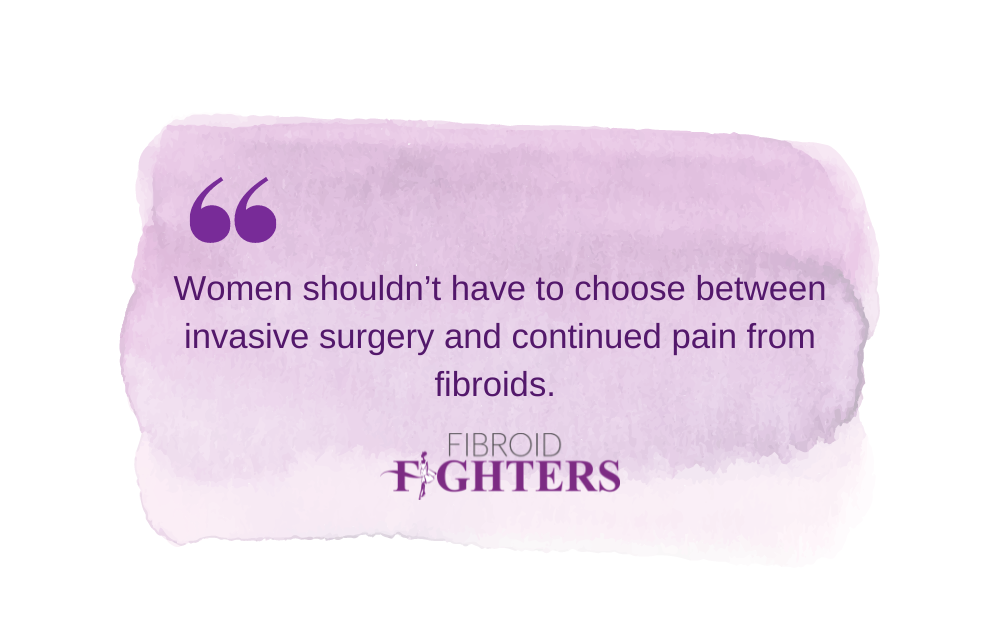
Katsnelson: We need to spread awareness that something can be done about fibroids. If the pain is severe, it basically paralyzes the normal woman’s life. They have prolonged menstrual periods, severe pain, and they’re constantly running to the bathroom. In addition to feeling bloated, 35% of women don’t have a sex life. Miscarriages are very damaging to both women and men. Fibroids affect women’s mental, physical, and economic health. It impacts their ability to go to school or work.
If dealing with fibroids is limited to suffering or surgical procedures such as a hysterectomy, this prevents many women from getting help. UFE treatment can be done in the office in about 40 minutes under light anesthesia. In about two hours, the patient can go home, their fibroids will shrink, and their toughest symptoms—from heavy menstruation to chronic abdominal pain—can disappear. This is a message that we need to spread so women don’t put off treatment.
Congresswoman Kelly, in 2016 you started the Congressional Caucus on Black Women and Girls with Congresswomen Yvette Clark and Bonnie Watson Coleman. How is this organization eliminating the barriers and promoting opportunities for black women?
Kelly: It came out of the She Woke Committee to advance issues and legislation important to the welfare of black women and girls. Since we started, we’ve been taking workshops, events, and seminars dealing with health education and criminal justice all over the United States. We’ve gone to New York, Washington D.C., New Jersey, Illinois, Tennessee, California, Seattle and we’ve talked about many topics. We talked about the barriers that black women face, but also the solutions. We want to highlight how we have broken through barriers and lifted up black women and girls.
We just released a report, “The State of Black Women and Girls in 21st Century America: An Analysis of Challenges and Opportunities”. It is a collection of essays by Black women leaders across the country who provided their perspectives on critical issues facing Black women and girls. But more importantly, it highlighted solutions to increase opportunities.
You’ve recently introduced legislation around expanding Medicaid which is related to your work on maternal mortality?
Kelly: Before four years ago, I did not realize it was such an issue in the United States. Someone introduced me to Judge Hatchet and I heard the story of her daughter-in-law, Kara Johnson. At a seminar in Washington D.C., I learned that in the United States that anywhere from 700 to 900 women die a year, and most of the deaths are preventable. And no surprise to anyone, black woman die at three times the rate of white women. And in some places, like where I live in Illinois, it is six times the rate. So, depending on where you are, it can be better or worse. I reintroduced legislation called the MOMMA’s Act with other members of Congress that will expand Medicaid from two months postpartum to a year.
What can we do to help these important women’s health topics and passage of legislation a reality?
Kelly: While we are the voice for the House of Representatives, we need the calvary—the people who we work with closely and really everyone—to call the legislators that represent them and ask them to vote on the Uterine Fibroid Bill. We need to educate the senators about what the issues are and what needs to be done. That helps us tremendously getting bills passed and shining a light on important issues.
Congresswoman Kelly, with everything you’re doing supporting women’s health, including the bills for Uterine Fibroid Research and Education and Maternal Mortality, what does the future look like for you if things come together as far as women’s health is concerned?
Kelly: I feel like because of COVID, light was shown on these disparities that have been going on for a long time. And, if you couple that with what happened with George Floyd and many others, I think there has been a conscience raising in this country about what people of color go through. I really believe that we’re in a moment. But it must be a movement, not just a moment. We must look at the social determinants of life and what we are going through, whether it’s health education, jobs, where we are in the C-suites, in the board rooms and criminal justice-wise.
I’m an optimistic person. So, I do see a movement, not a moment, and that we will be able to get some of these things done. There’re more women, there’s more diversity, there’s more people, whether they’re male or female that understand and care about the issues. I expect progress towards improving the quality of life for African Americans in this country.
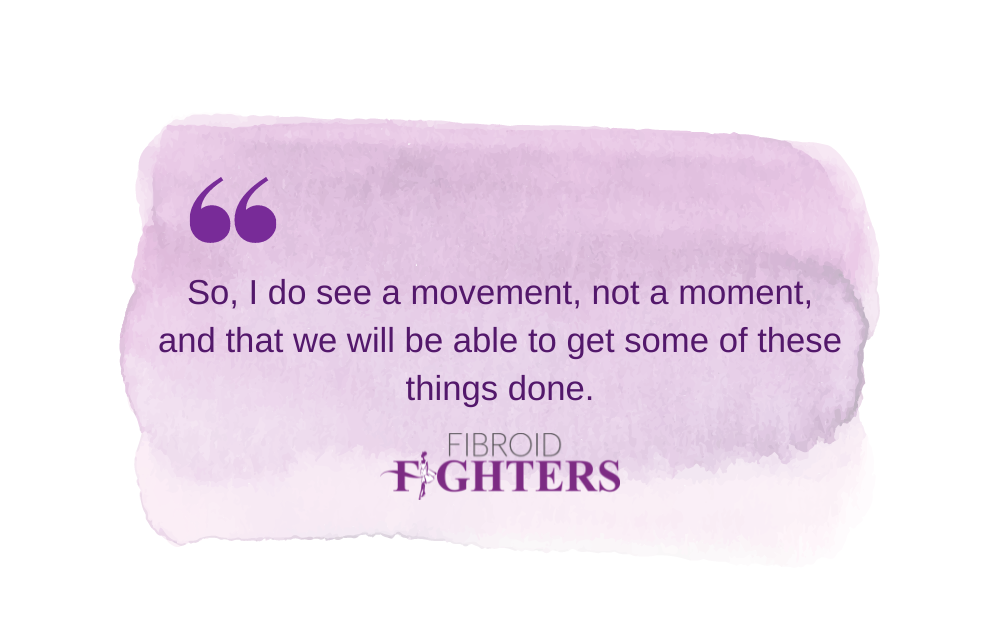
Katsnelson: Life, without suffering silently and alone from fibroid disease. I think that awareness, modern technology, digital health, and legislation will make talking about menstrual health and fertility as part of normal medical care. We have an amazing opportunity to make a tremendous difference in women’s health. If women, and not just women, but people start talking about this, we’ll increase awareness. July is Fibroid Awareness Month, and we hope will be able to talk about the passing of the Uterine Fibroid Research and Education Act.
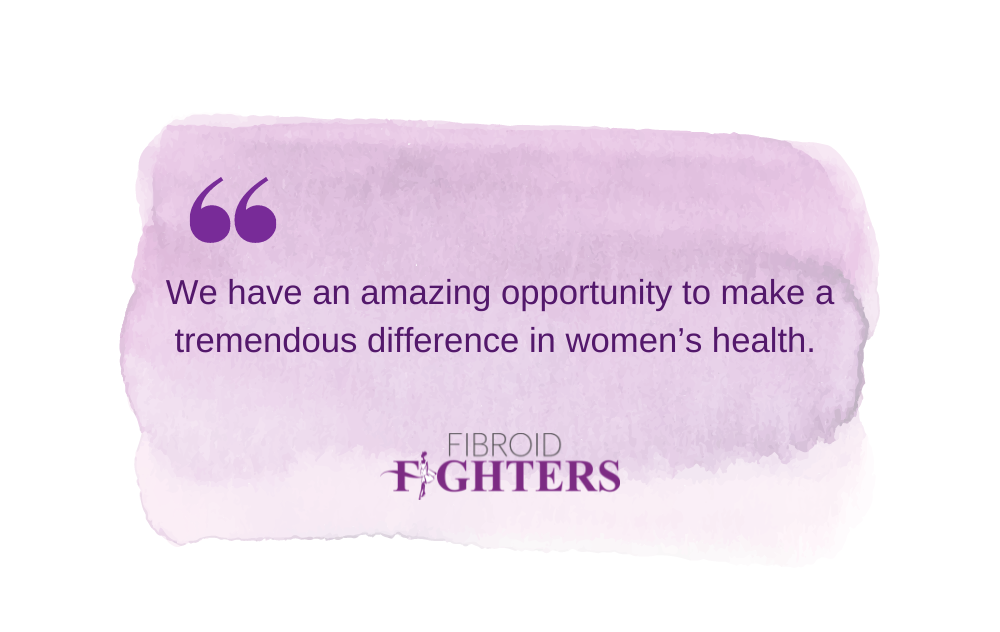
Fibroid Fighters’ goal is to focus national awareness on uterine fibroids that often go undiagnosed due to lack of education and research. They can cause significant pelvic pain, iron deficiency, anemia, miscarriages, infertility and heavy bleeding. Uterine fibroids are the most common cause of hysterectomies.
We are asking the community to help us spread awareness about fibroid disease. Share the “Break the Silence, Break the Video Series”. Tell your story. Read about the recent legislation Fibroid Fighters is supporting to improve fibroid education and promote research. Contact your legislator to support the bill. The more we spread awareness, we can make fibroid research, education and better treatment options a priority.





